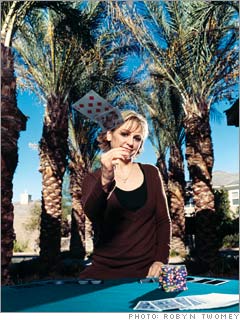Know when to press--and when to pull back.
Jennifer Harman, Professional poker player
Almost every day, a group of people gather in Bobby's Room at Las Vegas's Bellagio hotel to play poker. The play rotates every eight hands among 13 different styles of poker, and in each pot a player could win as much as $200,000. The "Big Game," as it's called, is the one that proves which players are the real deal. All of the regulars in the Big Game are men--that is, all of them but Jennifer Harman, whose outstanding track record in this game is why she's regarded as one of the best players in the world.
After the game, and usually in the wee morning hours, while Harman is driving home, she methodically reviews the events of the night. "I critique myself every time I play. It's like homework," she says. "I think about what players I need to watch more and what I need to do better." She learns from everyone and anyone, even the bad players.
Gamblers are supposed to be a superstitious lot, but Harman is pure pragmatism. She doesn't believe in luck, she says. "I don't have any rituals. Playing poker for me is like going to work for you." She adds, "I've been doing this too long to believe that I've just been lucky my whole life."
Harman's secret of success, in addition to her obsessive quest for self- improvement, is simple and unsexy: staying focused. "Poker is all mental," she says. In a tournament she can easily face a string of 15-hour days, where one mistake can mean elimination. Harman keeps her physical and mental stamina up by exercising daily and eating well. "I have carrot juice every day and wheatgrass juice when I can bear it." (She also aims for eight hours of sleep, but that's subject to change. She will soon be the mother of twins.)
Harman grew up in Reno and began playing poker when she was eight years old. As a result, the boy's world of poker has never intimidated her. "I've seen it happen so many times that women feel they have to overcompensate with aggression. Poker is about being aggressive, but it's also about knowing when to pull back."
Years of experience means that Harman has internalized the math, such as being able to instantly calculate the odds. That allows her to concentrate on the psychology, which is what differentiates top players. "You have to be able to get into their heads and know what they're thinking," she says. For example, she is always watching how people around the table are betting. She notices if a particular player goes "on tilt," meaning he's beginning to play with emotion instead of logic. The ability to do all that is something that comes with time. "Each hand tells a story," she says. "You have to be able to process that story and to follow through with your actions." -- By Bethany McLean

Gambler
Want to learn more Secrets of Greatness? Get the new book
|
|
